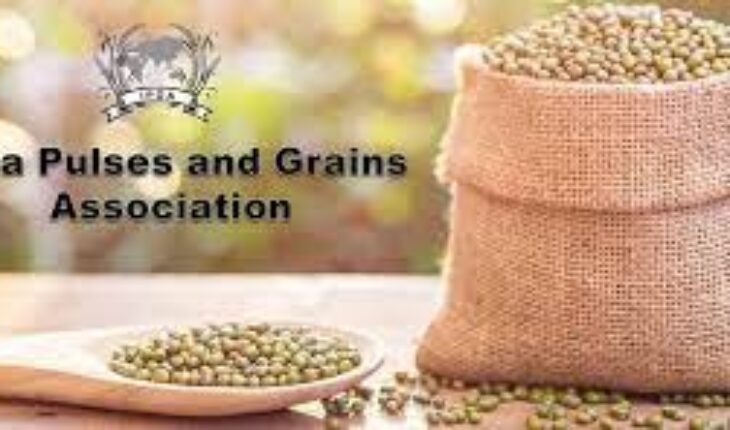By Dominick Rodrigues
The Dept. of Consumer Affairs (DoCA,) on May 17th, asked the Food and Civil Supplies Departments of State/UT Governments to use provisions of the Essential Commodities Act (EC Act) 1955 for ensuring adequate availability of the scheduled commodities at fair prices to the common people.
The DoCA had also advised the State Departments to direct pulses stockholders like Millers, Importers, Traders, etc. to declare their stock holding and also to verify the same.
These instructions only serve to create apprehension amongst trade stakeholders who are now hesitant to buy domestically produced pulses as well as import pulses,” Bimal Kothari, Vice Chairman – IPGA, told media while the government’s move as “defeating its very purpose to remove the restrictions on the imports of Tur, Urad and Moong.”

“As per the 3rd Advance Estimates data sourced from the website of the Ministry of Agriculture, for the Crop year 2020-21, Tur production is expected to be lower by almost 7 lakh metric tons and Urad is expected to be lower by 5.20 lakh metric tons, while overall Kharif Production is expected to be lower by 2.12 million metric tons.”
“However, as per trade estimates, the production for Tur has been around 2.90 million metric tons, Urad approx. 2.06 million metric tons, Moong around 2 million metric tons, Chana around 9 million metric tons and Masoor around 0.95 million metric tons. Given the ongoing COVID-19 pandemic, IPGA is expecting further shortages of pulses in the forthcoming crop year and believes that as the apex body for the trade, it is IPGA’s responsibility to bring this to the Government’s notice well in advance,” he said.
Noting that the Government’s objective to double farmers’ incomes can happen only through trade freely procuring their produce without fears of coercive action from the Central and State Governments, he said the Government – on the other hand – sought to ‘ensure adequate availability of the scheduled commodities at fair prices to the common people’, while traders are worried about legitimately-procured stock being also under the scanner and, in ambit of EC Act, land traders on the wrong side of law.
“Therefore, the Ministry of Consumer Affairs, Food and Public Distribution needs to issue a categoric clarification stating that their intentions are to just monitor stocks held by the trade for policy purposes — which will help assuage the apprehensions of the trade,” he added.
Highlighting the high prices of pulses on retail shelves, Kothari urged Government closely monitoring prices at the retail end as the IPGA — over the last few years — has been tracking the prices at the retail level vis-à-vis the prices at wholesale or ex-mill level. “We have found that the prices at retail level are traditionally higher than the wholesale/ex-mill rates by an average of Rs. 50/- per kg. In current times, while the average wholesale prices have been around Rs. 95/- per kg for Tur dal, Rs. 110/- per kg for Urad dal and Rs. 92/- per kg for Moong dal, the average retail prices have been Rs. 130/- per kg for Tur dal, Rs. 160/- per kg for Urad dal and Rs. 115/- per kg for Moongdal,” he said.
“However, anytime there is a discussion about high prices, the spotlight is placed on the traders and not the retailers. This needs to change and the retail segment also needs to be held monitored and held accountable for the high prices,” he said, adding that this is further strengthened by the fact that RBI in their annual report talked about the rising wedge between wholesale and retail pulses.”
Meanwhile, the IPGA has suggested relevant steps that can be initiated by the Government in this regard. These include: Setting up an MRP (maximum retail price) — for pulses to avoid sale at unnaturally high prices to consumers – which can be achieved by the DoCA on basis of data uploaded daily by wholesalers and retailers on the DoCA website.
Urging Government to explore options like using import duties to protect interests of domestic farmers as well as consumers, he said the Government can impose duties to a level that ensures the final landing price of the imported pulses being well above the MSP. This way, the trade will prefer to buy domestic produce when the prices are at or just above the MSP levels and, in case of shortages, import these commodities to bridge the demand-supply gap for ensuring adequate availability at affordable prices.
The IPGA urged the Government to ensure that any changes in policy framework is maintained for atleast a period of 6 to 9 months to ensure that there is no speculation — which could affect the prices overseas and in India – so that trade can function in a smooth and efficient manner.
The IPGA also noted that the Government needs to take into consideration key factors that govern the availability of pulses while drafting policies. Some of the factors are: Domestic production; Production in overseas origins and their harvesting periods; logistical issues like time taken from contracting produce and its sailing time from origins to India; Other countries that are also looking at buying the overseas produce and therefore possible availability for India to import these commodities; Effects of COVID-19 pandemic in India and overseas on sowing, harvesting as well as logistics.
“We need the Government to recognize the fact that the trade is key link in the farm-to-fork value chain. If the trade reduces its procurement of pulses from the farmers, it will directly affect their earnings and will also result in lesser supplies to the consumers which will lead to shortages at the retail end and drive up the prices making them unaffordable for consumers,” Kothari added.
The India Pulses and Grains Association (IPGA), the nodal body for pulses and grains trade & industry in India, has over 400 direct and indirect members including individuals, corporates and Regional Pulses Traders and Processors Associations that highlight its pan-India reach to over 10,000 stake holders involved in the farming, processing, warehousing and import business of Pulses across the entire value chain.





